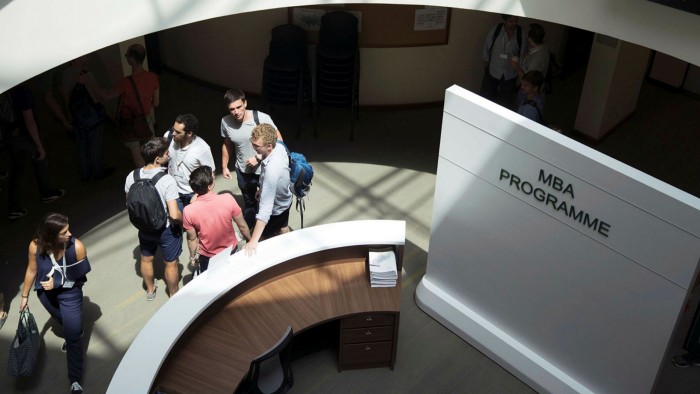Answers to reader questions: ‘should I study business in Asia?’

Roula Khalaf, Editor of the FT, selects her favourite stories in this weekly newsletter.
For students trying to decide whether to study for a business degree just when the pandemic is changing the courses on offer and how they are taught, Theresa Cho has some advice.
“If you want to, and can afford to, wait [to] experience the full-fledged, face-to-face educational setting, by all means you should wait. Most likely, however, even after the pandemic is over . . . classrooms will continue to rely on online mode, now that we have experienced all the benefits associated with it. In short, even if you decide to wait, online learning may not cease to exist.”

Professor Cho, associate dean at Seoul National University in South Korea, was a participant in a recent FT Q&A session as part of our special report on business education in Asia-Pacific.
Education leaders answered questions on themes including: the shift to online learning; job prospects in the region, and the outlook for internships. Here are some of the highlights:
Studies go digital
Geoff Perry, head of Asia-Pacific for the Association to Advance Collegiate Schools of Business, a leading accreditation agency, pointed out that technology has improved many business schools’ links with the wider world: “Since moving to virtual delivery, they have been able to connect leaders from industry and the broader community, both domestically and internationally, with students on their programmes.”
For Yuan Ding, dean of China Europe International Business School (Ceibs), in Shanghai: “There is always an element of risk-taking to quit your job and enrol in a full-time course. But if you are the type of person to embrace uncertainties, you will find yourself with like-minded individuals from around the world,” he said.
“Blended/online learning is the future. We all need to get mentally prepared for it,” added Dipak Jain, European president of Ceibs and board member of the European Foundation for Management Development, another global accreditor. “Change is inevitable, worrying is optional, and timely action is essential.”
Which region is best for me?
With Asia attracting extra interest thanks to its lower coronavirus infection rates, Steven Dekrey, senior adviser to the dean at HKUST, said students should decide to study “where you want your career to be. If you want international opportunities, study at a globally ranked school. But be forewarned, many opportunities require specific language skills.”
Advised Andrew Main Wilson, chief executive of the Association of MBAs: “Asia is the strongest performing economy and I would always advise potential students to obtain the best possible business education they can . . . A high quality business school MBA will almost always pay dividends.”
For those hesitating where to go, Anuradha Das Mathur, founder of The Vedica Scholars Programme for Women in New Delhi, urged would-be applicants to consider “the curriculum, the quality of faculty, the diversity of your peers, what differentiates the school, and of course the placement track record”.
How will the experience change?
When it came to future developments, Gerry George, dean of the Lee Kong Chian School of Business at Singapore Management University, predicted growth in new forms of online education, partnerships with other schools and innovation in the “transition between part time to full time, and online and offline, as well as shared courses/experiences with global partners”.
Gregory Whitwell, dean of the University of Sydney business school, predicted an expansion in online “admissions, recruiting, and experiential learning . . . and the growth of micro-credentials [qualifications in specialist topics]”.

Rajendra Srivastava, dean of the Indian School of Business, said: “There will be demand for more out-of-the-box and futuristic internships and jobs. A good business school will also equip its students to focus on emerging and futuristic concepts and approaches like AI, machine learning, [the internet of things], health management.”
For all the current upheaval, business schools’ advice for prospective students also includes much longstanding wisdom: take advantage of international and extracurricular activities; network with peers; cultivate time management skills; and master fundamental skills such as the basics of accounting.
Comments